Afghanistan War, CIA Sponsored Terror, Civil Liberties, Criminalizing Dissent, FBI Intrusion, Green Scare, Habeas Corpus, Human Rights, Iraq Veterans, Iraq War, Military Tribunal, Political Prisoner, Surveillance, Targeting Muslims, Truth to Power, War Resister
Podcast: Play in new window | Download
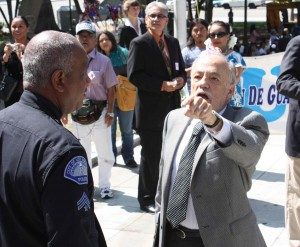
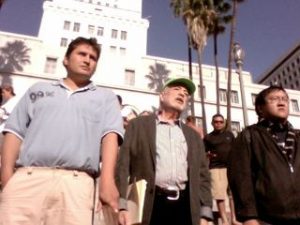
Lawyers You’ll Like : Attorney Jim Lafferty
Periodically we feature a segment on Law and Disorder called Lawyers You’ll Like. Our guest today is attorney Jim Lafferty. Jim has been a lawyer and movement activist in Detroit, New York City, and Los Angeles since the 1960s when he served as executive director of the National Lawyers Guild and carried out civil rights work in the deep South. He was one of the national leaders of the anti-war movement during the Vietnam War. He also headed up the very successful National Lawyers Guild chapter in Los Angeles for 25 years.
Guest – Jim Lafferty, Executive director of the National Lawyers Guild in Los Angeles and host of The Lawyers Guild Show on Pacifica’s KPFK 90. 7 FM.
—-

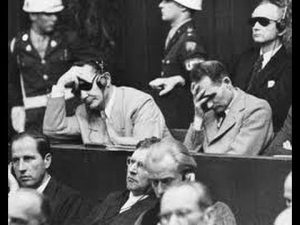
American Nuremberg: The U.S. Officials Who Should Stand Trial for Post-9/11 War Crimes
World War II started on September 1, 1939 when fascist Germany attacked its neighbor Czechoslovakia. By the end of the war six years later some 80 million people had died and the continent lay devastated. The first trials of 22 Nazi leaders, general’s and bankers wer organized by the victorious allies, America, Britain, Russia, France and took place in Nuremberg Germany. 19 were found guilty and executed. Robert H Jackson, Associate Justice of the US Supreme Court and Chief Prosecutor for United States and Nuremberg wrote then that “we must not forget that the record on which we judge the defendants today is a record in which we will be judged tomorrow.” A recent article – Crimes of the War on Terror Should George Bush, Dick Cheney, and Others Be Jailed?
Intentional war is the greatest of all crimes because it contains with it all the rest of horrible crimes. The United States of America’s intentional war against Iraq, which was motivated to the public with lies about weapons of mass destruction, and which has since spread to six other countries in the Middle East, has resulted in over 1 million deaths, driven millions more from their homes, and destroyed ancient peoples and their cultures.
The United States helped establish the international principles that guided the prosecution of war crimes when Nazi officials were held accountable for their crimes against humanity. But the American government and its legal system have consistently refused to apply the same principles to our own officials. In her book American Nuremberg, Rebecca Gordon indicts the officials who, in a just society, whould be put on trial for war crimes and crimes against humanity. She acknowledges that the U.S. government is unlikely to do this and proposes an alternative based on the Russell Tribunals held in 1967 exposing American criminality in the war against Vietnam.
Guest – Rebecca Gordon received her B.A. from Reed College and her M.Div. and Ph.D. in Ethics and Social Theory from Graduate Theological Union. She teaches in the Philosophy department at the University of San Francisco and for the university’s Leo T. McCarthy Center for Public Service and the Common Good. Previous publications include Letters From Nicaragua and Cruel and Usual: How Welfare “Reform” Punishes Poor People . Prior to her academic career, Gordon spent a few decades working in a variety of national and international movements for peace and justice. These include the movements for women’s liberation and LGBT rights; movements in solidarity with the struggles of poor people in Central America; the anti-apartheid movement in the United States and South Africa; and movements opposing U.S. wars in Iraq and Afghanistan.
——————————————————————————
CIA Sponsored Terror, Civil Liberties, Criminalizing Dissent, FBI Intrusion, NSA Spying, Political Prisoner, Prison Industry, Surveillance, Targeting Muslims, War Resister
Podcast: Play in new window | Download
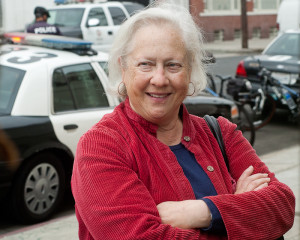
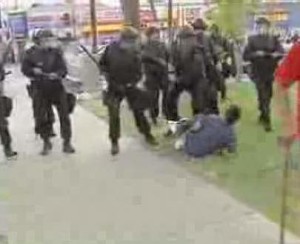
Lawyers You’ll Like – Attorney Carol Sobel
As part of our Lawyers You’ll Like series, we’re joined today by civil rights attorney Carol Sobel. Attorney Sobel has spent more than 2 decades working in various positions for the ACLU, including as Senior Staff Attorney. She also chaired the National Lawyers Guild mass defense committee for many years helping coordinate a nationwide defense of Occupy protesters and marshaling legal defense at several Democratic and Republican National conventions.
Carol has been involved in numerous significant cases in federal and state courts including on behalf of homeless individuals on Los Angeles’ skid row. She has been involved in numerous significant cases in federal and state courts. She served as local counsel for the Center for Constitutional Rights in Humanitarian Law Project v. Ashcroft and served on the Rampart Blue Ribbon Panel investigating police corruption in California. A graduate of the Peoples College of Law, since 2002, Carol has been named as one of Los Angeles’ Super Lawyers for Civil Rights.
—-


The War ISIS Wants: Nafees Hamid
Today we take a look into the psychology of terrorist recruitment and mindset in the wake of the coordinated attacks in Paris carried out by the Islamic state. We also look at the profound allure of the propaganda bringing young Muslims in to join ISIS and become a Mujahid. The transition from regular person to a warrior willing to die for the revolution happens quickly. In the article titled Paris: The War ISIS Wants by Scott Atran and Nafees Hamid, the ISIS movement is described as a trans-national movement, a sub state that doesn’t depend on an infrastructure of a state system. That and ISIS’s unitary message and appeal has created a big problem for the west using military action and ramped up mass surveillance to combat and intercept terrorist acts.
Guest – Nafees Hamid, Social Psychologist Nafees Hamid of University College London, researcher, actor and author of many articles including The War ISIS Wants.
——————————————
CIA Sponsored Terror, Civil Liberties, Criminalizing Dissent, FBI Intrusion, Habeas Corpus, Human Rights, Targeting Muslims, Torture
Podcast: Play in new window | Download
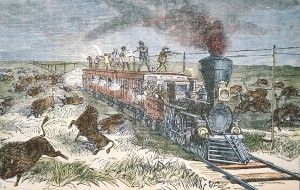
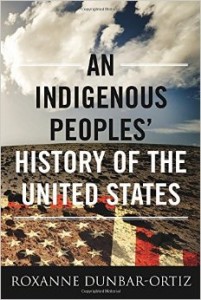
An Indigenous Peoples’ History of the United States
In the United States today, there are more than 500 federally recognized indigenous communities and nations comprising nearly three million people. These are the descendants of the 15 million people who once inhabited this land and are the subject of the latest book by Roxanne Dunbar-Ortiz. In An Indigenous Peoples’ History of the United States, Dunbar-Ortiz challenges the founding myth of the United States and shows how policy against the indigenous peoples was genocidal and imperialist—designed to crush the original inhabitants. Spanning more than 300 years, this classic bottom-up history significantly reframes how we view our past. Told from the viewpoint of the indigenous, it reveals how Native Americans, for centuries, actively resisted expansion of the U.S. empire.
Roxanne Dunbar-Ortiz:
- It’s absolutely necessary to know this history of settler colonialism and how it effects consciousness today of U.S. people and in the world because everyone is convinced of this myth of the United States and somehow its always going off the path of this destiny that has never been true in the first place.
- It’s like a fairy tale except its extremely deadly and dangerous.
- Other countries have romantic myths as their form of nationalism but they don’t control the world with this ideology.
- The myth is that it was a birth of settler democracy but we know from apartheid South Africa, we know from colonialism, particularly settler colonialism such as Israel.
- There are so many parallels with Israel because the Puritans and this became embedded in all settlers, had this idea of the new Jerusalem of Zion. They used that terminology.
- That God had given them this land to settle, it wasn’t just a right it was a responsibility to destiny, to the world.
- This made the native farmer and fisherman, ordinary people like other people in the world into savages and monsters, sort of like the Israelis to do the Palestinians today.
- Throughout the book I have a theme of the militarism and the counterinsurgency that attacks civilians and a food fight they call it, burns the food, supplies, the crops, burns the houses of the people in their towns, creates refugees. This then becomes the pattern.
- Every generation there is this Indian war. Vietnam looked like an Indian war, even the language they use – Indian country for enemy territory, all of the weapons they name after native people.
- This is not how we think of the United States, supposedly a civilian country, the military is always under control of civilians but that civilian president is commander and chief of the armed forces.
- There’s also a theory, the Bering Strait the one entrance to the whole continent, which is absurd because all of the people on the coast were great seafaring people.
- A part of European imperialism say as the beginning of everything that it connected people up. Actually what it did was separate people each other and their tradition.
- My specialization is the southwest and central Mexico, Central America. I knew there were complex trade routes and roads all over the place, irrigation canals, how they developed agriculture.
- The first chapter, Follow the Corn, I did just that. I followed out of Mexico, the dispersion of corn agriculture all the way to Tierra Del Fuego to the sub Arctic and coast to coast.
- What you find in the Americas is when they get to the point of abusing the environment and become dictatorial, there tends to be revolts to overthrow, that was happening when Cortez came to Mexico.
- The Quetzalcoatl cult that took over the Aztec government became abusive and was doing slave raiding. Had done a wonderful job of dispersing trade routes. Cortez simply allied with the rebels and overthrew the central government.
- Course they couldn’t know his intentions of simply wiping out their civilization.
- When British colonialism came to North America with these peculiar characteristics of the puritan ideology settling in. With 2 centuries of settler colonialism they developed this idea of ownership.
- It went from owning human beings to the idea of owning the land.
- George Washington was a surveyor and you have to ask why was such a super wealthy – a lowly surveyor?
- Surveyors got to choose the best land, and got to mark it up. They had already developed this idea of a Platte, creating territories that would then become states once they had a majority settler population.
- That’s why it took so long for Oklahoma, Oklahoma was the 47th state, New Mexico, Arizona, these places that had a majority native population.
- It was rough being native in the United States, it still is. I grew up in Canadian county Oklahoma, my dad sharecropped, and was a tenant farmer throughout that area until the depression wiped it out.
- The people went to California as refugees.
- I’m cautious about the identity because native nationalism Cherokee or Onondaga or Shawnee or Creek Muskogee
- There was an instance in 1917, I think its one of the most important moments in US history and hardly anyone knows about it. Jack Womack and I had written about it Monthly Review, it was called the Green Corn Rebellion.
- That is the main demand, land base, nationhood, the ability to prosper and exist as people, not just as individuals being assimilated out, that’s another form of genocide.
Guest – Roxanne Dunbar-Ortiz, grew up in rural Oklahoma, the daughter of a farmer and half-Indian mother. She has been active in the American Indian Movement for more than four decades and is known for her lifelong commitment to national and international social justice issues. After receiving her PhD in history at the University of California at Los Angeles, she taught in the newly established Native American Studies Program at California State University and helped found the departments of Ethnic Studies and Women’s Studies. Her 1977 book The Great Sioux Nation was the fundamental document at the first international conference on Indians in the Americas, held at the United Nations’ headquarters in Geneva. She is the author or editor of seven books.
—-
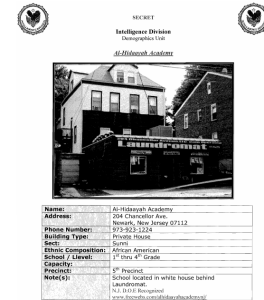

NYPD Muslim Surveillance Case Reinstated
After the 9/11 attacks, the New York City Police Department created a vast and covert suspicion-less surveillance program targeting Muslim American communities in New York, New Jersey, and beyond. The federal lawsuit Hassan v. City of New York challenges the constitutionality of this program. The original complaint was filed by Muslim Advocates in the District Court of New Jersey and later joined by the Center for Constitutional Rights. The lawsuit seeks an end to the program and destruction of any records gathered. Our client Zaimah Abdur-Rahim was spied on by the NYPD because she operates a grade-school for Muslim girls. NYPD officers recorded details about the school, such as the fact that it was run from Abdur-Rahim’s home and that its students were predominantly African-American. As the Associated Press reported in an award-winning series, the NYPD monitored and/or infiltrated almost every aspect of Muslim life, from mosques and student associations, to halal butcher shops, restaurants, and private citizens. Internal NYPD documents confirm that the program produced zero leads to terrorist activity after more than a decade in operation.
Guest – Ghita Schwarz, a senior staff attorney at the Center for Constitutional Rights. She works on racial justice, immigrants’ rights and government misconduct cases. Her current cases include the Freedom of Information Act cases Detention Watch Network v. ICE and Immigrant Defense Project v. ICE, seeking government transparency about controversial immigration detention and enforcement practices; Hassan v. City of New York, challenging the NYPD’s discriminatory program of surveilling Muslims; and United States and Vulcan Society v. City of New York, challenging long-term employment discrimination by the New York City Fire Department. Ghita’s past work includes Aguilar v. ICE, fighting ICE’s practice of warrantless home raids, and NDLON v. ICE, challenging government secrecy regarding DHS’ Secure Communities program. Prior to coming to the Center for Constitutional Rights, she worked at LatinoJustice PRLDEF, the Door Legal Services Center, and Legal Services for New York City. Ghita graduated from Harvard College and Columbia Law School. Ghita’s recent writing includes “Why New York is Still the Capital of Immigrant America,” published in The Nation.
—-
Civil Liberties, FBI Intrusion, Habeas Corpus, Human Rights, Political Prisoner, Prison Industry, Surveillance, Targeting Muslims, Truth to Power, War Resister
Podcast: Play in new window | Download
Updates:
- Hosts Remember People’s Lawyer Liz Fink
—-

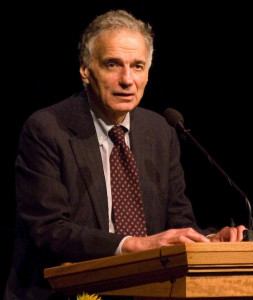
The American Museum of Tort Law
After trial lawyers told him they had no place to display exhibits they had used in court, Ralph Nadar realized that there isn’t a single museum devoted to the law in the United States. That’s about to change. The consumer advocate is opening the American Museum of Tort Law in his hometown of Winsted, Connecticut to celebrate victories of the law over corporate power. The museum will span the history of tort law – civil law that seeks relief for people injured by wrongful acts of others – and host exhibits on significant cases such as the 1998 national settlement with tobacco companies. Nader said it may also host artifacts including a Chevrolet Corvair – the car featured in his 1965 book “Unsafe at Any Speed,” which made him a household name.
Guest – Ralph Nader, attorney, political activist, consumer advocate, presidential candidate and author who among many accomplishments is responsible for 8 major federal consumer protection laws and helped established the PIRGS – Public Interest Research Groups.
—-
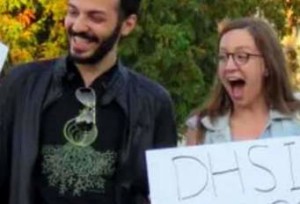
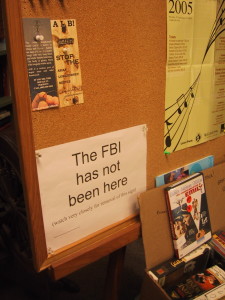
The Library Freedom Project Protects Library From DHS Surveillance
With a population just above13,000 people, the quaint town of Lebanon, New Hampshire is nestled not far from the Connecticut river in the northwest corner of the state – a few miles from Dartmouth College. In July, the local library set up a system to protect the privacy of patrons using its computers by installing Tor, the platform that routes users’ Internet traffic through various relay points, making warrantless surveillance of browsing habits and traffic more difficult. The Kilton Library’s Tor relay node attracted the attention of the Department of Homeland Security, which contacted local officials and law enforcement, warning that Tor could aid criminal behavior. In response, the library intially took down the relay, but later changed its mind and reinstalled it.
Guest – Alison Macrina is a librarian, privacy rights activist, and the founder and director of the Library Freedom Project, an initiative which aims to make real the promise of intellectual freedom in libraries by teaching librarians and their local communities about surveillance threats, privacy rights and law, and privacy-protecting technology tools to help safeguard digital freedoms.
——————————————-
CIA Sponsored Terror, Civil Liberties, Criminalizing Dissent, FBI Intrusion, Guantanamo, Habeas Corpus, Human Rights, NSA Spying, Political Prisoner, Prison Industry, Supreme Court, Surveillance, Torture, Truth to Power, War Resister
Podcast: Play in new window | Download
Update:
- Remembering Julian Bond, Social Activist, Civil Rights Leader, Politician, Professor and Author.
—-
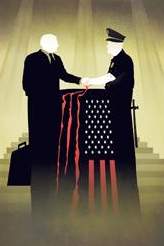
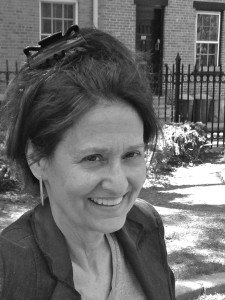
Heidi Boghosian: Prevent Police Killings Before They Happen
America has awakened in the past year to the epidemic of police killings of unarmed civilians, many of whom are African-American. The list of names grows longer by the week — Eric Garner, Michael Brown, Tamir Rice, Freddie Gray, Rekia Boyd, John Crawford and Sandra Bland to name several recently. Each time one of these criminal acts is committed, a cry goes up to prosecute the police officer responsible and bring justice to the victim. Read More.
Attorney Heidi Boghosian is the executive director of the A.J. Muste Memorial Institute, a nonprofit charitable foundation providing support to the nonviolent movement for social change. Before that she was executive director of the National Lawyers Guild. She is author of the book “Spying on Democracy: Government Surveillance, Corporate Power, and Public Resistance” (City Lights, 2013).
—-
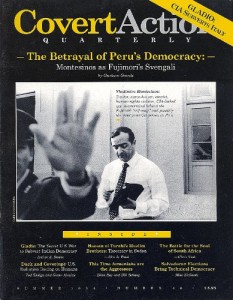
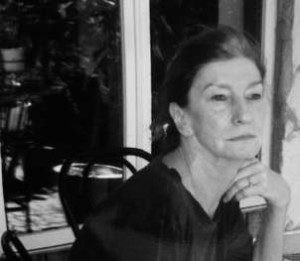
Ellen Ray: Co-Publisher of Covert Action Information Bulletin
Last week family and friends gathered at St Marks In The Bowery Church to remember documentary filmmaker, publisher, journalist and activist Ellen Ray. Ellen Ray was co-publisher of the magazine Covert Action Information Bulletin, which exposed CIA covert actions around the world, publishing the names of hundreds of CIA agents. As a result, the law changed (The Intelligence Identities Protection Act of 1982) making it illegal. As head of Sheridan Square Press, Ellen Ray published the memoir of New Orleans District Attorney Jim Garrison, which became the basis of Oliver Stone’s film, “JFK.” Ray is survived by her husband, attorney Bill Schaap, she was 75. Text of the speech by Michael Smith. Here is the video produced Joe Friendly.
—-
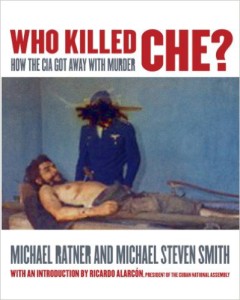
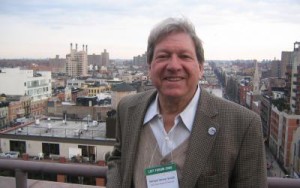
Different Ways to Skin a Cat: From the US Assassination of Che to Obama’s Recognition of Cuba
We hear a speech delivered by our own Michael Smith at Socialism Conference in Chicago titled Different Ways to Skin a Cat: From the US Assassination of Che to Obama’s Recognition of Cuba. The highpoint of U.S. counter-revolutionary policy towards Latin America came with its murder of Che Guevara, in Bolivia and the overthrow of governments including Allende’s in Chile, thus isolating Cuba throughout Latin America. Now the U.S. is isolated and the American government has had to change its tactics. The strategy of overthrowing the gains of the Cuban revolution and capitalist restoration remain.
—————————————————
Afghanistan War, CIA Sponsored Terror, Civil Liberties, Criminalizing Dissent, Death Penalty, FBI Intrusion, Habeas Corpus, Human Rights, Political Prisoner, Prison Industry, Supreme Court, Surveillance, Truth to Power, War Resister
Podcast: Play in new window | Download
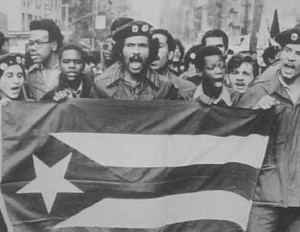

Lawyers You’ll Like : Attorney Linda Backiel
As part of our Lawyers You’ll Like series today we speak with attorney Linda Backiel. She’s a lawyer and poet living in San Juan, Puerto Rico. She’s played an instrumental role in defending independentistas in the fight against colonialism in Puerto Rico. As part of that struggle she defended those who were ultimately successful in kicking the military out of Vieques. A small island near Puerto Rico. For 40 years of law practice, she devoted much of her energy to the defense of political prisoners often with her friend and mentor, Lenny Weinglass. A Poem For Lenny Weinglass.
Guest – Attorney Linda Backiel, a criminal defense attorney and poet living and practicing law in San Juan, Puerto Rico. Here is Linda Backiel’s transcript from the talk she gave at the celebration of the 50th anniversary of the Criminal Justice Act.
—-
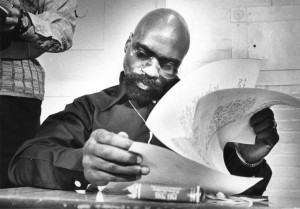
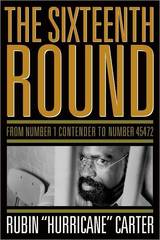
Rubin “Hurricane” Carter 1937-2014
In April of this year, celebrated boxer and prisoner-rights activist Rubin “Hurricane” Carter died at the age of 76. He had become an international symbol of racial injustice after his wrongful murder conviction forced him to spend 19 years in prison. Carter was arrested for a triple murder in his hometown of Patterson, New Jersey. He said he was innocent, was convicted by an all white jury, and sentenced to three consecutive life sentences. In 1976, the New Jersey State Supreme Court overturned his conviction on grounds the authorities withheld material evidence from the defense. But Carter was convicted again in a second trial in 1976. In 1985, that conviction was overturned by a U.S. district court judge, who concluded the state made an unconstitutional appeal to racial prejudice. In 1988, the Passaic, New Jersey, Prosecutor’s Office dropped all charges against Carter.
Attorney Myron Beldock:
- He was a defendant in a criminal case in New Jersey involved the triple shooting and three murders of 3 people in the Lafayette bar in Patterson, New Jersey.
- He and his co-defendant John Artis were represented at the first trial and they lost, (convicted) and Rubin started his campaign to get out of jail and wrote his book the 16th Round.
- He was charismatic and powerful, a great thinker, very very intellectually strong person as well as being spiritually strong.
- Almost a typical case, high profile case, where you get people who are vulnerable and easily manipulated because of their need for their own benefits to falsely testify.
- We set aside the convictions when we learned about the benefits that were given to the witnesses.
- We went again to trial in 1975. At that time the atmosphere had changed. There was a new prosecutor, they came up with a theory that it was actually a racial revenge killing.
- Earlier that night, a white former bar owner had shot and killed the black purchaser of the bar from him.
- That was always known and there was no motives attributed to the killings in the first trial but the second trial really based on speculation and bias, they argued persuasively to the jury that this was a racial revenge killing.
- Mr. Bellow who was the supposed eye witness who testified, there were two of them in the first trial, was being questioned by me on the stand as to why he recanted his recantation. The prosecutor persuaded him to again tell the story he told at the first trial, identifying Rubin and John and I was trying to establish that they had falsely manipulated him when I was pulled into the chambers along with my co-counsel Louis Steele who represented John Artis and told that if I question him further, the jury would learn that he passed the lie detector test, supporting what he said at the first trial. Supporting his identification (of Rubin Carter)
- We did have that test. It seemed like that was the result because that’s the way it was written. In fact that was a fraud.
- The polygraph results were completely opposite of what they were purported to be.
- The prosecutors in that case, two of them became judges, rewarded for what they did.
- Rubin was not a popular person, he had been an outspoken civil rights person. It was a cesspool of rumors without any evidentiary basis.
- The entire community there almost in Passaic New Jersey treated us like we were the devil.
- It was the coldest community reception I ever encountered in any place.
- Rubin would call every year (from Canada) on the anniversary of his release. He got a group of Canadian do-gooders and free thinkers to join him in fighting to set aside convictions for people who were wrongly convicted in Canada.
- He would vet the briefs that we sent. He was a very unusual client.
- Rubin refused to act as a prisoner because he wasn’t anyone who was guilty he said.
- So, he didn’t eat prison food, he didn’t take prisoner assignments, he didn’t wear prison clothes and somehow or other he was able to pull that off.
- People think of it as being another time, I’ve been practicing law long enough and I don’t think anything changes.
- The same kind of bias runs deep throughout the community its just masked somewhat differently.
- You make your luck in these cases, you have to forge ahead.
- His insistence on being an innocent person and will not compromise with the system is the kind of inspiration that pushes us on as lawyers.
Guest – Attorney Myron Beldock, graduated from Erasmus Hall High School in 1946, Hamilton College in 1950 and Harvard Law School in 1958. He served in the U.S. Army from 1951 to 1954 and as an Assistant U.S. Attorney in the Eastern District of New York from 1958 to 1960. After several years as an associate with a small New York City firm and as a single practitioner, he brought together two friends and former Assistant U.S. Attorneys, Elliot Hoffman and Larry Levine, to form Beldock Levine & Hoffman in 1964. He is best described, by his own definition, as an old-time general practitioner. He concentrates on trial and appellate litigation, in state and federal courts, in defense of criminal charges and in pursuing plaintiffs’ civil rights actions based on police and prosecutorial misconduct and employer and governmental discrimination. He regularly consults and defends charges of professional discipline. He represents plaintiffs and defendants in a wide variety of personal and business related matters, working with others in the firm’s various practice areas.
———————————————-

























